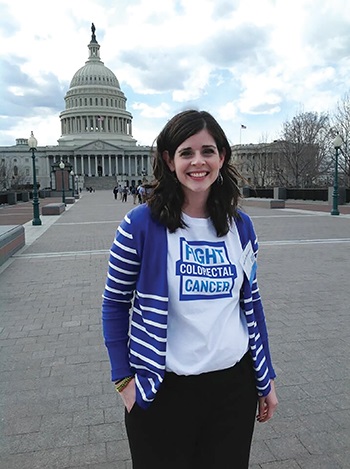Advanced Colon Cancer Survivor
Everyone Deserves a Magical Feeling of Support
 Body stuff mortified Danielle Ripley-Burgess in eighth grade, from buying toilet paper with her mom to thinking about puberty. So there was no way she was telling anyone she saw blood when she pooped, a secret she kept for three years until she was diagnosed with Stage III colon cancer.
Body stuff mortified Danielle Ripley-Burgess in eighth grade, from buying toilet paper with her mom to thinking about puberty. So there was no way she was telling anyone she saw blood when she pooped, a secret she kept for three years until she was diagnosed with Stage III colon cancer.
Seeing blood in my stool was embarrassing, so instead of telling anyone, I rationalized what caused it. Maybe it had to do with my period. Or maybe my diet. I stopped eating Twizzlers and tomato sauce. Really, anything red. When that didn’t help, I just ignored it.
In high school, the blood turned darker, so I told my mom. She searched the internet, which was relatively new. The most likely cause was hemorrhoids. The end of the article said it could be serious, but we figured that was for people my grandparents’ ages. I could live with hemorrhoids.
One day I thought I had to pass gas, but instead I passed a large amount of blood. Freaked out, I told my boyfriend Mike something was really wrong but didn’t give details. He pestered me for two months about making a doctor’s appointment. My mom overheard us and was shocked my problem was still going on. She told my dad, and things escalated quickly. Our family doctor insisted we see a gastrointestinal (GI) doctor, which I’d never even heard of. After a test and a colonoscopy a few days later, I learned another new word: malignant. My diagnosis was Stage III colon cancer. I had just turned 17.
The next six months were filled with aggressive treatment, including surgery to remove a small part of my colon, chemotherapy, ovary suspension surgery, which left me infertile but saved the hormone function, and radiation therapy. I wasn’t treated at a children’s hospital, so I quickly became the unicorn in the oncology ward: always the youngest with colon cancer. Even at a well-known cancer center where we sought a second opinion, I heard how rare my diagnosis was for someone my age.
Everyone was optimistic I’d recover. I guess ignorance really is bliss because I had no idea colon cancer was life-threatening. I had the luxury of just focusing on getting better, and even that was hard sometimes. Cancer messed up my plans. I couldn’t eat a bunch of salad at Applebee’s with my friends from school anymore because I couldn’t eat salad. But they’d stopped inviting me anyway. That hurt even more than cancer. Mike was a saint though, visiting every weekend from college. Nurse Kim, along with many other nurses, always made me feel special and supported.
My treatment was successful. Genetic testing didn’t raise any red flags, and I had no family history of cancer. It appeared my diagnosis had been a fluke. I began a follow-up schedule and went back to normal life. Nurse Kim found a college scholarship for cancer survivors. My goal was to earn a communications degree and work for a cancer nonprofit. I earned my degree and married Mike.
About 7 years after my diagnosis, I discovered the Colon Club, an advocacy group primarily for people diagnosed under 50. On their website, I read story after story and was amazed. I’d never met others like me, let alone people so young! It felt magical. I modeled for the “Colondar,” a calendar featuring young survivors. I formed relationships that would become even more valuable six months later when I heard “It’s cancer” again.
Discovered by a routine colonoscopy, it was Stage I this time. Surgery removed all but 13 inches of my colon. I was hospitalized for a month with several complications. Eventually, we found out my cancer is genetic, and I was diagnosed with Lynch syndrome.
Cancer at 25 is much different than cancer at 17. Angry and scared, I felt betrayed not only by my body, but by God. I had to accept that the first diagnosis wasn’t a fluke. Cancer was going to be in my life. Over time, my faith was restored.
Counseling and blogging helped me heal, and my family and friends were wonderful. The support from new friends in the cancer community was phenomenal. They, too, had faced multiple diagnoses and the same surgery. They shared what to read and what to eat. I wouldn’t be where I am without them.
Eventually, life’s hardships eased up. Mike and I adopted our beautiful daughter. I accepted my dream job as the Fight Colorectal Cancer (Fight CRC) Communications Director. Working in the community helped me make sense of my own experience, and it made me healthy and whole again.
I left Fight CRC’s staff, yet I’m still involved as an advocate and as the editor of Beyond Blue, Fight CRC’s magazine. One reason I left was to slow down and write my book, Blush: How I Barely Survived 17. Ultimately, the shift allowed me to focus on my number one priority: our daughter. She is close to the age I was when I first became embarrassed about my body. I need to be there for her, to make sure she feels confident and assured I’ll be listening if she speaks up when something isn’t right.
If one life changes – be it hers or anyone else’s – because they’ve heard my story, that’s the real magic of all of this.


